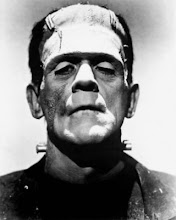Wednesday, April 28, 2010
Romantic Hero
-Philip
Romanticism in science
http://en.wikipedia.org/wiki/Romanticism_in_science
- Philip
Tuesday, April 27, 2010
The ethereal beauty of Nature

The Romantics really appreciated nature and treated as if it was alive. In the novel Frankenstein, there are many references to nature to emphasize its importance, for example, Frankenstein’s creature states, “My spirits were elevated by the enchanting appearance of nature; the past was blotted from my memory, the present was tranquil, and the future gilded by bright rays of hope and anticipations of joy.” This awakening to how beautiful and glorious nature is can only be possible through the openness and clear mind of a Romantic thinker because he sees nature beyond the limits of mechanism.
-Francisco
Monday, April 26, 2010
Am I a Romantic?

I consider myself somewhat a romantic thinker because I see the emotion and imagination as an integral part of the cosmos; furthermore, I believe that they are needed in order for someone to experience important states of being. With this in mind, I was “romantically” thinking about Jean-Jacques Rousseau’s quote, “man is born free, but he is everywhere in chains,” and I wondered about whether humans can ever achieve true freedom. Well, I consider freedom to be “the will to consciously choose,” and belief that escape is only possible through the mind. The concept of physical freedom is not possible at all since the body inevitably decays; however, the conscious awareness of oneself has a chance of living on. For example, if Joe was in captivity in some prison with no possibility of escape, he could still find peace in his mind. Moreover, according to some ancient beliefs, he can even free himself from physical bondage by leaving his body. In American society, people are not as free as they think they are because most of their actions are dependent on reasons that are not entirely theirs. However, since the only thing that matter is the freedom of the mind, then one can truly be free because a person’s actions and his mind do not have to go hand in hand. In the novel Frankenstein, the creature committed many atrocities; however, was he the only one to blame for his actions? Or, could those responsible for his experiences be blamed as well? The creature is an example of a being that is not entirely free because his actions were dependent on reasons that were not entirely his, but learned through experiences.
- Francisco
Romanticism influences Art

A movement in Western art of the 19th century generally assumed to be in opposition to Neoclassicism and much associated in America with Thomas Cole and the Hudson River School of painting between 1820 and 1880. Romantic painters treat the landscape as though it has symbolic meaning far beyond its obvious geographical features. Cole and his followers believed that natural features were created by God, and that a quiet, reverent artist could find God in nature, especially in wilderness areas, and then transfer symbolically resulting inspirations to canvas. Romantic works are marked by intense colors, turbulent emotions, complex composition, soft outlines and sometimes-heroic subject matter. Source; Andrew Wilton and Tim Barringer, "American Sublime: Landscape painting in the United States, 1820-1880" (LPD)
www.askart.com
Victor is a Romantic
First, there is the obvious example of Victor Frankenstein pushing against his limitations as a human being by striving to play a God-like role by making the Creature. For Victor, it is not satisfying enough to simply study philosophy and science and proceed on to a respectable profession. He must perfect the role of the scientist by attempting to accomplish the impossible, a process which is inevitably frustrated, as it must be, by the fact that overstepping human boundaries has significant consequences. Shelley’s Frankenstein is not a mad scientist, as his character has been reduced to over the years, but a scientist who is passionate about the primary questions and preoccupations of his time. In his Romantic quest for a scientific ideal—the perfect human—he creates a monster, who then must be held in check by other systems and institutions that humans have also created. While these institutions are more concrete and based in reality than the creation of the monster, they are equally imperfect. This novel helps the reader understand that there is no such state as perfection. Furthermore, there is no social experiment, whether based in reality or in fantasy, that will result in an ideal solution. Rather, human beings will always create imperfect institutions and inventions, and given this, must be prepared to accept responsibility and anticipate the potential consequences.
http://www.articlemyriad.com/romanticism_frankenstein.htm
Saturday, April 17, 2010
Insightful Empathy
 The Romantic influence is clearly displayed as Mary Shelley writes Frankenstein with words of emotion throughout and surrounding significant circumstances in the book. She captivates the reader and overwhelms them with feelings as they read about life altering events with emotion.
The Romantic influence is clearly displayed as Mary Shelley writes Frankenstein with words of emotion throughout and surrounding significant circumstances in the book. She captivates the reader and overwhelms them with feelings as they read about life altering events with emotion.